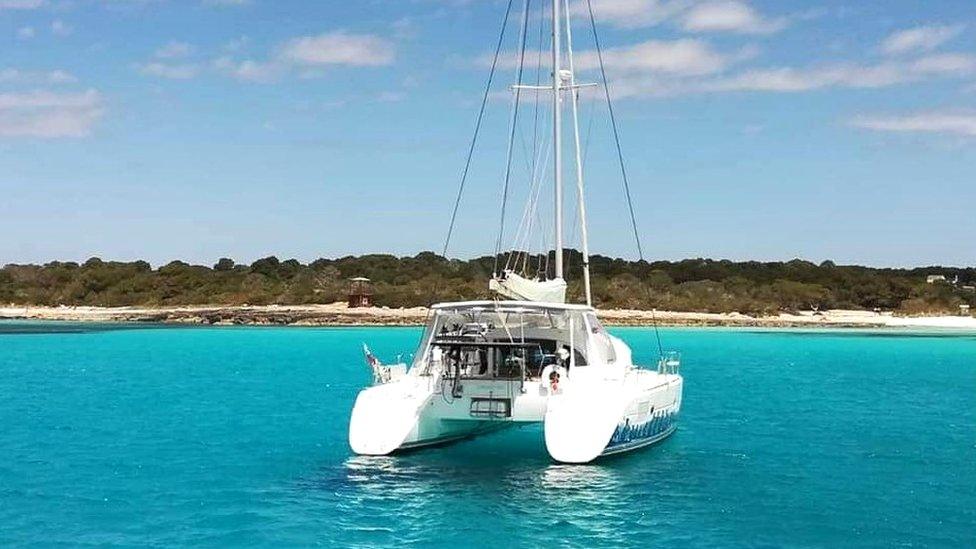Coronavirus: Surviving lockdown like a real-life Robinson Crusoe
- Published
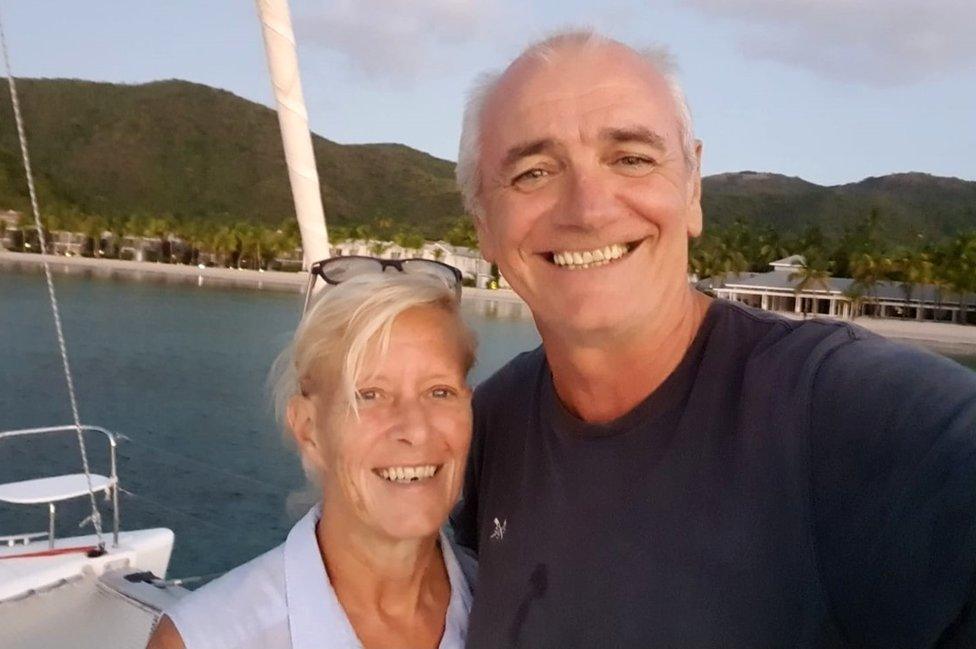
Lynda and Steve Dalgleish are stuck in the Caribbean due to the coronavirus lockdown
When Lynda and Steve Dalgleish set off to sail around the world, little did they know they would find themselves trying to escape hurricanes amid Caribbean islands in lockdown.
The 18-month adventure to kickstart their retirement became a quick learning curve in survival and relying on the friendship of others.
A £6,000 machine to turn salt water into fresh water which they had bought in Italy and a huge stash of emergency dried foods and tins onboard became their lifeline.
And meeting local Antiguan woman Nadine and a fisherman after diving off their catamaran, Blue Tattoo, and swimming ashore meant they had fresh fruit, vegetables and fish while they were stuck off the coast of Antigua for three months.
Now moored in a lagoon in Grenada after being granted sanctuary from the hurricane zone in Antigua, they have spoken to BBC Scotland about their "emotional and terrifying" experience.
Lynda, from North Berwick in East Lothian, said she felt like the fictional castaway Robinson Crusoe who spent years on a deserted tropical island after tourists left and locals locked themselves indoors.
She said: "Every island locked down very fast and the normally busy island of Antigua where we were became like a desert island.
"Tourists had flown home and locals were indoors. Everything was shut and the bay we were in was empty.
"The challenge for us was that everything was locking down and there were no facilities.
"We were trapped and I suddenly felt so far away from home and family.
"I was emotional about it as I saw everything closing down and it was terrifying for us. I was worried about having no fresh food and whether the island was going to get any supplies, or how long was this going to go on for.
"We decided we needed a strategy and that we needed to find a bay to moor in."
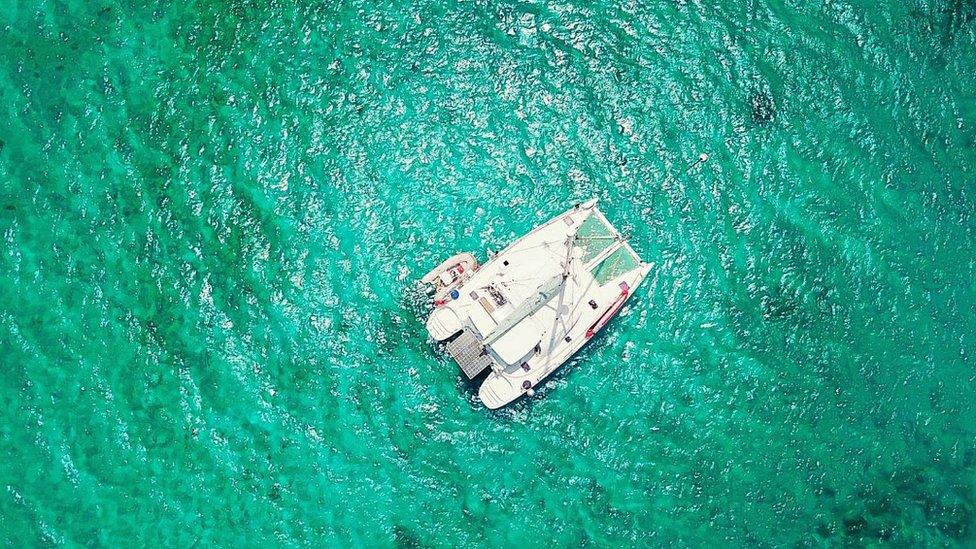
Lynda and Steve Dalgleish spent three months anchored in Carlisle Bay off the coast of Antigua
The couple found a sheltered bay called Carlisle Bay in Antigua.
Lynda said: "The longer we were there, the more wildlife took over as it was deserted.
"Thankfully, more yachts came and there were about 12 of us and we all pooled our money.
"I had dived off the boat and swum ashore and that was when I met a lovely local woman called Nadine.
"Nadine then started leaving lots of fruit and vegetables on the beach for us and we would dive off each day to collect it.
"It took a while but eventually the fishermen realised they could sell their catch to us too, and so we had dolphin fish and tuna and lobsters.
"Everyone helped each other and I have never known anything like it."
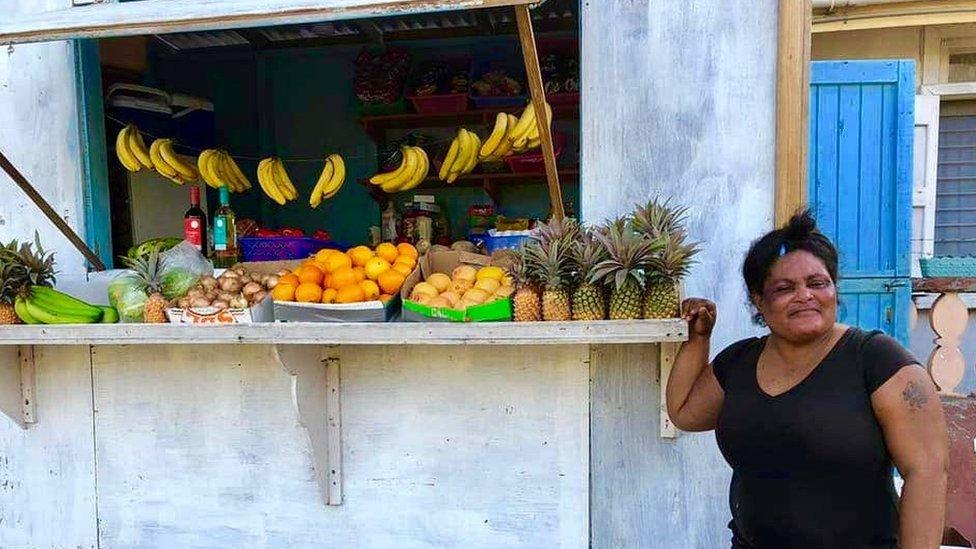
Nadine brought them fresh fruit and vegetables during their three months in Antigua
After three months they had the added worry of hurricane season being upon them - so they decided to sail south.
But Trinidad and Tobago authorities would not let them within five miles of the islands.
They finally managed to persuade Grenada to let them seek shelter there and quarantined on their boat for 14 days before they were allowed to venture on to the island in search of food.
Lynda said: "It took three days of sailing to get to Grenada. Then we heard a small and agile hurricane called Gonzalo was on course for us. It was very unusual to track so far south and so early.
"I was very terrified."
It missed them on Sunday and Lynda said: "It was a very frightening few days."
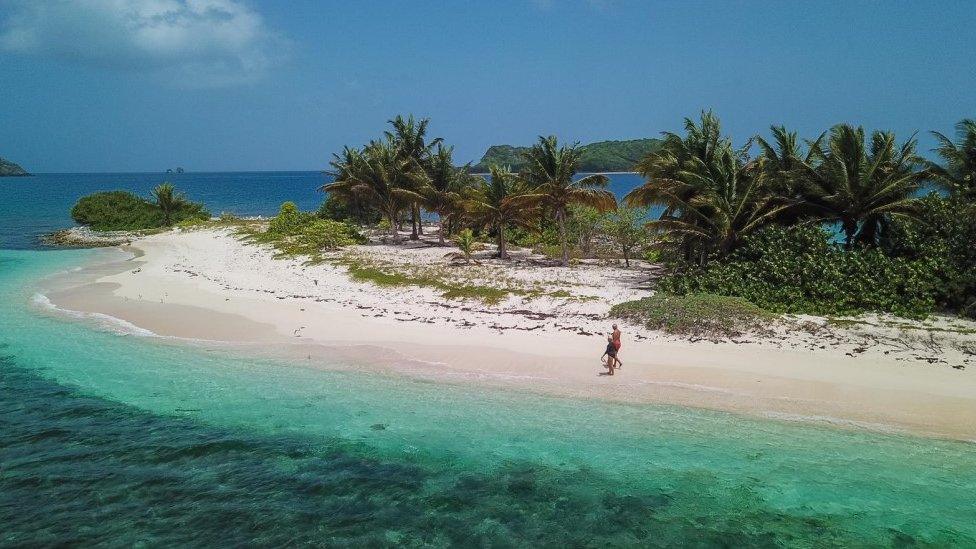
Lynda and Steve Dalgleish walking on Sandy Island near Grenada
The pair set off on their trip on 1 May 2019 from Roda de Bera, near Barcelona, on board their newly-bought 38ft catamaran.
Lynda, 62, a retired marketing director, and Steve, 63, who owned a web analytics business, had no sailing experience.
So Steve completed a three-month intensive course, sailing monohulls in Gibraltar, before they set sail.
It was 10,000 miles and 19 countries later that they became stranded in the Caribbean when the lockdown came into force in March.
They are now currently in a lagoon in Grenada.
Lynda said, at first, they did think about crossing back over the Atlantic to get home.
She said: "It took 21 days to get our boat over the Atlantic and that was in the direction of the trade winds. It would not be pleasant battling into the trade winds in the other direction.
"And the worst weather was our crossing from Gibraltar to the Canary Islands. That was horrific with six-metre waves, it's called following seas and I was terrified. I really thought I was going to die. It was really scary and the mainsail crashed down."
So, for now, they will stay where they are and hope for no more hurricanes and that they can continue on their journey soon.
